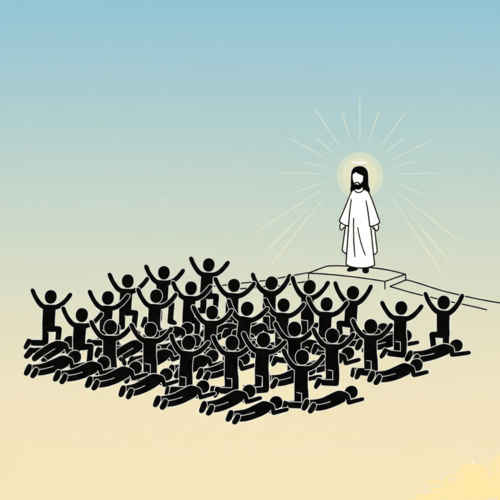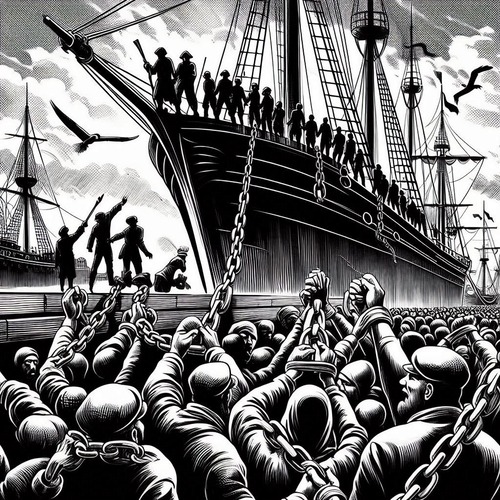Didn’t The Early Christians Cast Lots? Why Don’t We?
The Early Christians Cast Lots… Throughout Christian history, believers have sought God’s guidance in making important decisions. When we read the Bible, we encounter something that seems strange to modern eyes: the practice of casting lots to discern God’s will. This raises an important question: if Bible characters and early Christians used lots, why don’t we follow their example today?
INSTANCES OF LOT-CASTING IN THE BIBLE
Scripture records an impressive number of instances where lot-casting was used as a legitimate means of seeking divine direction—nearly 70 occurrences in the Old Testament and 7 in the New Testament. The frequency underscores that it wasn’t an occasional or marginal practice, but a well-established method of discerning God’s will in biblical times.
In the Old Testament, we see lots used for various significant purposes. When Joshua divided the Promised Land among the tribes of Israel, he cast lots “before the Lord” to determine each tribe’s inheritance. The selection of Saul as Israel’s first king involved lot-casting, demonstrating its role in major leadership decisions. The high priests regularly used the Urim and Thummim, special lots carried in their breastplate, to seek God’s guidance for the nation.
In the New Testament there are seven references to lot-casting, with the most significant one being the selection of Matthias to replace Judas as the twelfth apostle (Acts 1). Notably, this is the final instance of lot-casting recorded in Scripture.
The Lot-casting Ended In Acts 1: What changed? The casting of lots ceased after Acts 1. The timing is particularly striking—it ended with the dramatic outpouring of the Holy Spirit at Pentecost in Acts 2. The timing is no coincidence. The sudden cessation of lot-casting coincides precisely with the inauguration of the church age and the coming of the Holy Spirit to indwell believers.
The arrival of the Holy Spirit at Pentecost marked a profound transition in how God guides His people. With the completion of the biblical canon and the gift of the indwelling Holy Spirit, believers no longer need the external mechanism of lots to discern God’s will. We’re given something—and Someone—infinitely better—the complete written Word of God and the internal guidance of the Holy Spirit. The Spirit illuminates the Word and guides us in applying it to our lives.
WHY DID GOD PERMIT LOT-CASTING IN THE FIRST PLACE?
God, in His wisdom, provided lot-casting as a means of guidance during specific periods of redemptive history for several profound reasons. First and foremost, it demonstrated He knew how critical His leading was to His people.
But Wait a Minute: Couldn’t God Have Led His People Audibly? As a holy God dealing with sinful humanity, direct audible communication would have been overwhelming and potentially destructive for fallen creatures. As Reformed theologians have noted, drawing from Exodus 33:20 where God tells Moses “no one may see me and live,” the unmediated presence of God’s holiness would be lethal to sinful humans.
This truth is powerfully illustrated in Isaiah 6, where even the righteous prophet cried out in terror, “Woe to me! I am ruined!” when encountering God’s holiness. The Israelites themselves begged Moses to be their intermediary after hearing God’s voice at Sinai, saying “Don’t let God speak to us directly, or we will die!” (Exodus 20:19). In His merciful accommodation to human frailty, God provided lot-casting as a means of communication that allowed Him to guide His people while shielding them from His overwhelming presence.
Significant OT Instances of Lot-Casting:
- The selection of the scapegoat on the Day of Atonement (Leviticus 16:8)
- Division of the Promised Land among the tribes (Joshua 14-19)
- Identifying Achan’s sin in the defeat at Ai (Joshua 7:14)
- Choosing Saul as Israel’s first king (1 Samuel 10:20-21)
- Distributing priestly duties in the temple (1 Chronicles 24:5)
- Determining who would live in Jerusalem (Nehemiah 11:1)
- The sailors identifying Jonah as the cause of the storm (Jonah 1:7)
How Lot-casting Helped: God’s provision of lot-casting reflected both His holiness and His grace. His holiness made direct communication dangerous for sinful human beings, while His grace provided an alternative means of guidance. This method accomplished several purposes:
- It protected people from the consuming fire of God’s immediate presence
- It provided clear, unambiguous direction when needed
- It demonstrated God’s sovereignty while maintaining human responsibility
- It prevented human manipulation of divine guidance
- It created community consensus in important decisions
WE DON’T CAST LOTS ANY MORE, BUT HOW ARE WE BETTER OFF?
While the end of lot-casting may initially seem like a loss, we’re actually far better off than Old Testament believers. The Holy Spirit’s guidance through the Word represents a remarkable advancement in God’s relationship with His people. Here’s how. We now have:
- Personal Indwelling Rather Than External Signs: Where ancient believers had to seek guidance through external means like lots, we have the Holy Spirit personally indwelling us. As Jesus promised, “He will guide you into all truth” (John 16:13). This intimate, internal guidance far surpasses the mechanical nature of lot-casting. The Spirit works directly in our hearts and minds, illuminating Scripture and shaping our understanding.
- Complete Rather Than Progressive Revelation: We possess the complete canon of Scripture, which the Spirit uses as His primary instrument of guidance. As the Westminster Confession beautifully states, Scripture contains “all things necessary for God’s own glory, man’s salvation, faith, and life.” Instead of seeking divine direction through lots, we now have access to the full counsel of God’s written Word.
- Mature Rather Than Elementary Guidance: Paul describes the old covenant elements as “elementary principles” (Galatians 4:3), while we have graduated to mature sonship. Rather than depending on yes/no answers from lots, we’re called to develop spiritual wisdom and discernment. The Spirit helps us understand and apply biblical principles, grow in wisdom through experience, exercise sanctified judgement and make decisions that honour God.
- Corporate Rather Than Isolated Guidance: While lot-casting was often limited to leaders or priests, we experience the Spirit’s guidance within the community of believers. The church helps us understand Scripture, receive wise counsel, prevent individual error, and as a means of confirming the Spirit’s leading.
- Transformative Rather Than Merely Directional: The Spirit’s guidance through the Word doesn’t just tell us what to do; it transforms who we are. This represents a profound advancement because our minds are renewed to think biblically, our desires are aligned with God’s will, our character is shaped to make godly decisions, and our dependency shifts from external signs to spiritual maturity
- Freedom Rather Than Restriction: Where lot-casting provided binary yes/no answers, the Spirit’s guidance through Scripture offers wisdom for complex situations. This gives us freedom to exercise wisdom within biblical boundaries, responsibility to grow in discernment, maturity to handle nuanced decisions, and joy in discovering God’s will through His Word.
- Lasting Rather Than Temporary Guidance: Instead of seeking one-time answers through lots, we receive ongoing guidance through the Spirit’s illumination of Scripture. This produces a growing understanding of God’s ways, deepening spiritual maturity, increasing wisdom for decisions, and lifelong transformation into Christ’s image.
In the absence of lot-casting, we’ve been given something far better—the Spirit Himself, working through the completed Word, transforming us into people who can discern and delight in God’s will. As New Testament believers, we don’t need to pine for ancient methods of guidance. Instead, we can rejoice in the superior means God has provided through His Spirit and Word.
SO HOW DO WE FIND GOD’S WILL NOW?
Romans 12:1-2 provides our foundational framework for discerning God’s will: “Do not conform to the pattern of this world, but be transformed by the renewing of your mind. Then you will be able to test and approve what God’s will is—his good, pleasing and perfect will.” This transformation through mind renewal comes through systematic study of Scripture, earnest prayer, and the Spirit’s illumination. Rather than seeking pat answers through mechanical means, we’re called to a deeper engagement with God’s Word that shapes our entire thinking process. Our renewed mind becomes the instrument through which we discern God’s will in specific situations.
Ephesians 5:17 reinforces this approach: “Therefore do not be foolish, but understand what the Lord’s will is.” Notice the emphasis on understanding rather than merely receiving direction. We’re called to grow in wisdom and discernment, developing a biblical worldview that enables us to make decisions that honour God. This happens through regular Bible study, meditation on Scripture, prayer, fellowship with mature believers, and the accumulated wisdom of walking with God. Unlike lot-casting, which provided immediate answers but required no spiritual growth, this approach transforms us into people who can both recognise and delight in God’s will.
CONCLUSION: THE EARLY CHRISTIANS CAST LOTS, BUT WE DON’T NEED TO
While we may sometimes wish for the simplicity of casting lots to know God’s will, we’ve been given something far superior. The complete canon of Scripture and the gift of the indwelling Holy Spirit mark a profound advancement in how God guides His people. We don’t need to cast lots because we have continuous access to God’s wisdom through His Word and Spirit. The new covenant reality calls us not to seek shortcuts or signs, but to invest in the deeper work of mind renewal and spiritual transformation. As we grow in our understanding of Scripture and walk in step with the Spirit, we develop the spiritual maturity to discern God’s will in any situation. The absence of lot-casting isn’t a loss to be mourned but a sign of our privileged position as mature sons and daughters, called to know and follow our Father’s will through the superior guidance He has provided In Christ.
THE EARLY CHRISTIANS CAST LOTS—RELATED FAQs
What exactly did casting lots involve in biblical times? Casting lots likely involved small stones, pieces of wood, or marked pottery shards that were drawn or thrown to determine God’s will. While the exact method varied, it provided clear yes/no answers or choices between options, similar to drawing straws but conducted with solemn reverence as a means of seeking divine guidance.
- Were there different types of lot-casting in Scripture? Yes, Scripture records several variants including the Urim and Thummim used by priests, the general casting of lots for land division, and the Purim (lots) cast by Haman. The Urim and Thummim were specially designated divine lots carried in the high priest’s breastplate, while other instances used simpler methods, but all were considered means of determining God’s will.
- Was lot-casting the same as gambling or divination? No, biblical lot-casting was fundamentally different from gambling or pagan divination because it was authorised by God and conducted under His sovereignty. Proverbs 16:33 states “The lot is cast into the lap, but its every decision is from the Lord,” emphasizing God’s control over the outcome rather than chance or supernatural forces.
Why did God choose this method of guidance? God provided lot-casting as a means of protecting sinful humans from His direct, overwhelming presence while still providing clear guidance. This form of divine accommodation demonstrated both God’s holiness and His grace in providing a way to know His will that wouldn’t destroy His people.
- Can Christians use modernised versions of lot-casting today? No, attempting to recreate lot-casting through modern methods (like flipping coins or using apps) would be inappropriate and potentially sinful. God has given us His completed Word and indwelling Spirit, making such practices unnecessary and potentially demonstrating a lack of trust in His appointed means of guidance.
- How can we be sure of God’s will without lots? We discern God’s will through Scripture study, prayer, wise counsel from mature believers, and the Spirit’s illumination. This process, while requiring more spiritual maturity than lot-casting, produces deeper understanding and Christ-like character as we learn to think biblically and apply God’s Word to our circumstances.
What’s the significance of lots ending at Pentecost? The timing of the final biblical lot-casting in Acts 1, immediately before Pentecost in Acts 2, marks the transition to the church age and superior means of guidance. This demonstrates God’s progressive revelation, showing how the coming of the Spirit and completion of Scripture provided better means of knowing God’s will than the elementary principles of the old covenant.
THE EARLY CHRISTIANS CAST LOTS—OUR RELATED POSTS
Editor's Pick

The Christian Sabbath: Why Did Sunday Replace Saturday?
Consider this: God-fearing Jews who’d faithfully observed Saturday Sabbath for over a thousand years suddenly began gathering for worship on [...]

Did the Early Christians Worship Jesus? The Biblical Evidence
It was a startling transformation: Jewish fishermen who'd spent three years following this itinerant carpenter from Nazareth now begin to [...]

If Jesus is Messiah, Why Aren’t ALL Messianic Prophecies Fulfilled?
If Jesus is truly the Messiah, why hasn't world peace arrived? Why do Jews still face persecution? Why isn't the [...]

When Courage Fails: Will I Be Forgiven If I Deny Christ in Persecution?
The rooster crowed, and Peter remembered. In that devastating moment, the apostle realised he’d just done the unthinkable—three times he’d [...]

What Makes a Godly Dad? 5 Biblical Principles Fathers Need
Modern culture sends fathers mixed messages. Be strong but sensitive. Be involved but not overbearing. Lead but don’t dominate. With [...]

What Makes a Godly Mom? A Scripture-Backed Guide
In our culture’s confusion about gender roles and parenting, the timeless question remains: what makes a godly mother? While secular [...]

Paul’s Mandate for Men: Headship Or Servant Leadership? Or Both?
Modern Christianity has fallen into a trap. We've created an either/or battle between "headship" and "servant leadership," as if these [...]

Should We Stop Using Male Pronouns for God? Why Do We Say No?
A friend of ours arrived eagerly at his first theology class in seminary. But he quickly discovered something troubling: the [...]

Did Old Testament Law Force Women to Marry their Rapists?
**Editor’s Note: This post is part of our series, ‘Satan’s Lies: Common Deceptions in the Church Today’… Viral misinformation abounds [...]

From Danvers To Nashville: Two Statements, One Biblical Vision
30 years separate the Danvers Statement on Biblical Manhood and Womanhood (1987) and the Nashville Statement on Human Sexuality (2017). [...]
SUPPORT US:
Feel the Holy Spirit's gentle nudge to partner with us?
Donate Online:
Account Name: TRUTHS TO DIE FOR FOUNDATION
Account Number: 10243565459
Bank IFSC: IDFB0043391
Bank Name: IDFC FIRST BANK






